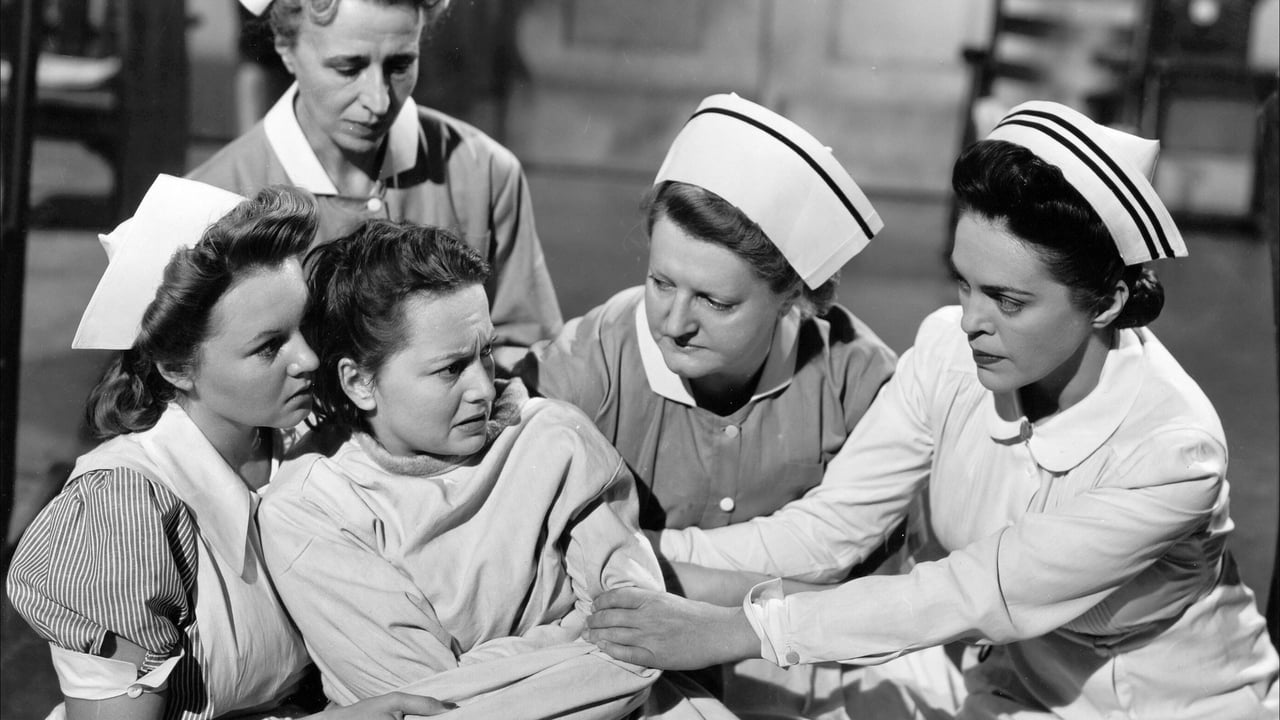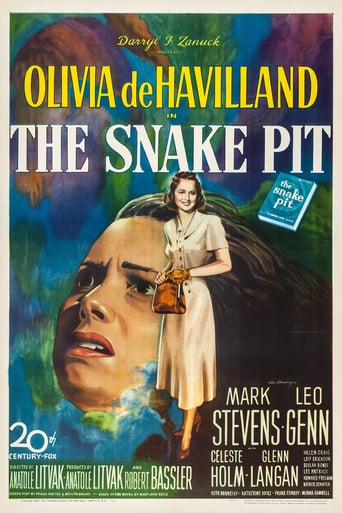IslandGuru
Who payed the critics
Livestonth
I am only giving this movie a 1 for the great cast, though I can't imagine what any of them were thinking. This movie was horrible
PiraBit
if their story seems completely bonkers, almost like a feverish work of fiction, you ain't heard nothing yet.
Cassandra
Story: It's very simple but honestly that is fine.
lasttimeisaw
Touted as the first film explicitly recounting a patient's baptism of fire in a mental institution, THE SNAKE PIT, directed by Anatole Litvak and starring a doughty Olivia de Havilland (102-year-old-young as of today) as our protagonist Virginia Cunningham, still pluckily holds court after seven decades have elapsed. Litvak's opening swiftly plunges audience together with Virginia in her wandering mental state in medias res, a woman discernibly suffers from amnesia and dogged by hallucination (the voice in her head), has no inking of her whereabouts and the impending revelation of being locked up inside a psychiatric hospital for women shocks her to the core and simultaneously piques our curiosity, what is wrong with her? The puzzle will be solved by a meandering but ultimately satisfying and commendably less lurid approach, through the intermittent flashback fragments, first from Robert (Stevens, a carbon copy of Dennis Morgan, the star in Sam Woods's KITTY FOYLE, 1940), her clueless but all-too-understanding foil hubby, and in time, by way of the radical therapies at the behest of Dr. Kik (Genn, exceptionally transmits a clinical yet personable poker-faced sensibility), through Virginia's own endeavor, which accumulatively dredges up her subconsciously suppressed memories, and traces the root of her condition in her Electra complex at a very young age and ensuing guilt germinates after the death of her father and another father figure. The script conscientiously shirks any shocking-value manipulation, and patiently unfolds Virginia's tale-of-woe with a limpid sense of scientific correctness (electro-shock therapy, hypnotherapy, hydrotherapy and straitjacket, the whole package is here) and a winning consideration toward our heroine, whose taxing waxing-and-waning battle (the lowest point is to being thrown into the titular snake pit, a place for those who are beyond help, with an added figurative signification of the extreme means subjected to them, to treat insanity with insane action) against schizophrenia earns the auspicious ending over the long haul fair and square.The story's positive overlook on Virginia's recuperation doesn't necessarily overshadow Litvak's unsparing depiction of an overpopulated institution, regulated by its own echelons and bureaucracy, yet, in presenting the often vilified hospital staff, he maintains a perspicacious mind, there are good apples and bad apples, but mostly they are just trying to do their overloaded job and occasionally are afflicted by career fatigue, even the most callous one, nurse Davis (quite a scene-stealer Helen Craig), turns out to be driven more by her self-seeking consciousness than sadistic vileness. Time and again, the film proves that each head case is an entrancing thespian per se (great cameos from Celeste Holm, Beulah Bondi, Lee Patrick, Betsy Blair and then some), but a striking vibe of sororal unity points up Litvak and co.'s humane disposition that overpowers any attempt of caricature or exploitation.A de-glamorized de Havilland pours herself all on her character, brilliantly alternates between Virginia's manifold frames-of-mind, running the gamut from intense distress to heart-felt compassion, and makes the movie a compulsive viewing even just for the sake of her performance alone, whereas in those quieter moments, she can also make her marks in imparting Virginia's transient displacement with nuances and bonafides, a sterling showcase for her acting chops, and a compelling case study that doesn't relinquish its rapier-like perception for the sake of dramatization, more importantly and edifyingly, THE SNAKE PIT alerts us that it is not that rare for a person to go off the trolley, damage might have be done from the very start.
kijii
I have seen this movie several times and know that it received high critical acclaimed for its realistic depiction of what went on inside of psych wards at that time. It was nominated for six Oscars, including Best Picture, Best Actress (Olivia de Havilland)—her fourth such nomination, Best Director (Anatole Litvak), Best Screenplay, and Best Music (Alfred Newman). It won an Oscar for Best Sound Recording. De Havilland gives a standout performance as the main character, Virginia Cunningham, who has suffered a psychotic breakdown and placed in an insane asylum for treatment after her husband, Robert (Mark Stevens). Leo Genn also gives a great performance has her doctor, Dr. Kik, who uses both electroshock treatment and drug-induced hypnosis to get to the root causes of Virginia's her deep-seated psychological problems that relate back to her childhood. I think it must be very difficult to stage group scenes of patients in a psych ward since the scenes in this movie, at times, seem just as campy as those in Shock Corridor (1963). The scenes must require a type of choreography which is hard to capture on film. In spite of the great character actors used in them: the best scenes with other patients are those in which de Havilland relates separately and more directly: Grace (Celeste Holm), Hester (Betsy Blair). Mrs. Greer (Behlah Bondi). Also, when you see Mrs. Stuart (Natalie Schafer)---Virginia's mother in a flashback to when she was a little six-year-old girl--you might recognize her as Lovey Wentworth Howell from Gilligan's Island.
georgeusx
When I was 8 I remember visiting my mother at Pilgrim State Hospital on Long Island. Years later I saw this film and it was if I was back at Pilgrim State. Realistic, frightening, heart-wrenching, poignant and yet, in the end, hopeful. Some others have mentioned the non-Oscar for de Havilland. Yet she did get two for other films in the same era( Streep has only one Oscar for best actress with more than a dozen nominations). Others have mentioned other films about mental illness, yet the one that comes closest to this in terms of realism and total effect, I believe, is Lost Weekend, which won a Best Picture Oscar just a few years earlier.
DKosty123
This film presents a very realistic look at mental hospitals in the era it was made. Mainly, this is a great performance by Olivia De'Havilland that really carries a well conceived script & makes it a very good film drama.Natalie Schaefer (Mrs. Thurston Howell III for you fans of Gilligans Island) has a very good small support role in this too. A lot of the rest of the cast is not real well known, but everyone does well in this script about a woman with major problems due too a troubled childhood.Her husband can't help her but finally a Doctor does & at the end of the movie after several setbacks, she finally gets out of the hospital. This movie proves how good an actress Olivia is as the film is more than 95 percent centered on her central character & she carries this film brilliantly. If you get a chance to catch this one, you will not lose anything as this film is very well done.

